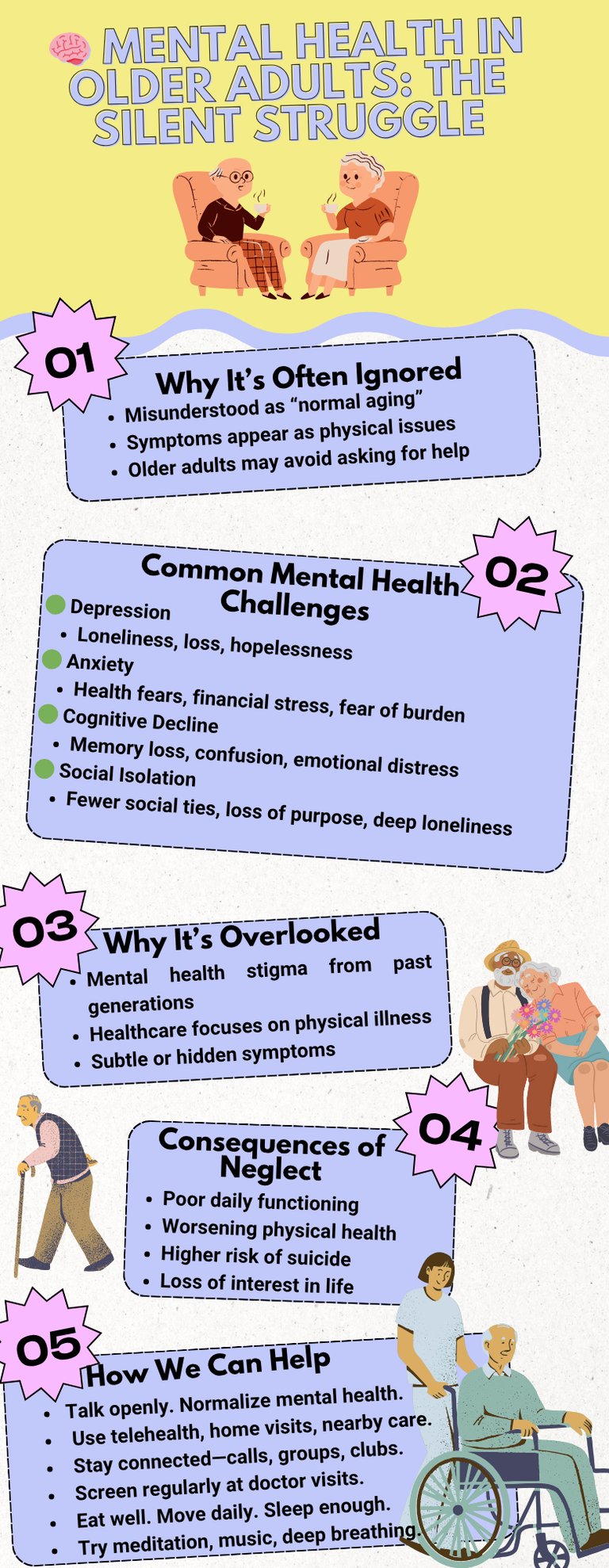Mental Health in Older Adults: Silent Struggles of Aging
Everyone ages; it is a natural aspect of life. As we age, not only do we change physically, but also mentally. In the aging population, mental health problems slowly develop, and they are commonly neglected or misunderstood by their families and society in general.
Faiza Zulfiqar
5/26/20256 min read


Everyone ages. It's a natural part of life. As we age, changes happen not just physically, but also mentally. In older adults, mental health problems often slowly develop. Sadly, they're usually ignored or misunderstood both by families and society. This is a real “silent struggle.” One that affects the quality of life in a big way. Yet, it rarely gets the attention it truly deserves. In this blog, we'll discuss the mental health challenges older adults face. We'll explore why these issues often go unnoticed and what we can do to help.
Why Mental Health in Older Adults Is Often Overlooked
One big reason these issues stay invisible is how society views aging and mental health. People often assume aging automatically means decline. So when older adults show signs of depression or anxiety, it’s brushed off as “normal aging.” In reality, although aging brings some changes, poor mental health is not one of them.
Another issue? In older adults, the symptoms of mental health issues might not appear the same as they do in younger people. For example, depression may not show up as sadness. Instead, it may seem like fatigue, headaches, or digestive problems. This makes it easier for caregivers and even healthcare providers to completely ignore or misdiagnose mental health problems.
Common Mental Health Challenges in the Aging Population
The following are some of the most common mental health issues that older adults often face, which can affect their overall well-being and quality of life:
1. Depression
Feeling depressed is common in older people. Sadly, most people who suffer from it don’t get the treatment they need. They may feel a deep loss, loneliness, or frustration over losing independence. This can lead to hopelessness.
2. Anxiety
Aging brings many worries. Poor health, money problems, or the fear of being a burden can lead to intense anxiety. However again, this often gets dismissed. Some may think it's just "confusion" or part of getting old.
3. Cognitive Decline and Dementia
While dementia and Alzheimer’s are not classified as mental illnesses, they often lead to mental health challenges. Memory loss and confusion can result in fear, frustration, and sadness. It’s emotionally painful for both the person and their family.
4. Social Isolation
As people age, they often become more isolated. This may happen due to retirement, disability, or the loss of a spouse or friends. Over time, this isolation can badly affect their mental health. Humans need connection and without it, older adults are more likely to feel anxious, depressed, and lonely.
Why These Issues Are Often Ignored
Many older adults grew up in times when talking about mental health was taboo. They may have to step out of their comfort zone to ask for help with their mental health. Some may even think, “I should just get over it" or “I’m too old for therapy.” Others might not even realize they have a problem especially if they’ve never dealt with mental health issues before.
Besides, our healthcare system often focuses more on physical than mental health. Physical illnesses like heart disease, diabetes, and arthritis usually get top priority whereas mental health mostly takes a backseat. In many cases, unless there's a serious decline in cognitive abilities or noticeable memory issues, conditions like depression or anxiety often go unnoticed.


The Effects of Untreated Mental Health Issues
Leaving mental health problems untreated can be dangerous. Depression has been linked to a higher risk of death from heart disease and other illnesses. Social isolation increases the risk of dementia. Chronic anxiety can worsen existing medical conditions. Over time, it also becomes harder for older adults to manage daily tasks. They may stop taking care of themselves or lose interest in life.
Worst of all, untreated mental health issues can turn what should be a peaceful, fulfilling time of life into a period of sadness, confusion, or even suicidal thoughts. Instead of enjoying this stage of life, they may be confined by their thoughts and experience a poor quality of life.
How We Can Help
Everyone has a role to help, including families, doctors, and whole communities. Here’s how we can help:
1. Promote Open Conversations
Let’s break the stigma. It’s important to challenge the stigma around mental health and ensure that people with mental health issues are treated as equally valuable members of society. Let them open up about how they feel, without holding back. Let them express what they’re going through. Remind them that it’s okay to ask for help and that recovery is possible.
2. Improve Access to Care
Unfortunately, many senior citizens face big barriers, including a Lack of money, transport, or awareness. We need to bring care closer to them. Telehealth, home visits, and community mental health services should be more accessible and affordable.
3. Encourage Social Connections
Preventing isolation is crucial. Social interaction can greatly improve mental health. Even small efforts like regular phone calls or community events can help. Families should stay in touch, and communities can host clubs or support groups to keep seniors connected.
4. Include Mental Health in Routine Checkups
Doctors should treat mental health the same as any other health concern. This means checking older patients for depression, anxiety, or memory loss during regular checkups so problems can be found early. This helps start recovery faster.
5. Support Healthy Habits
Physical health plays a crucial role in how you feel inside. Encourage seniors to move more and eat well. Simple activities like taking a short walk, doing light yoga, or eating healthy and balanced meals can help older adults feel better. These small steps can lift their mood, give them more energy, and improve their overall well-being.
6. Practice Mindfulness and Relaxation
Simple activities, like meditation, deep breathing, or calming music can reduce stress. Adding a few minutes of relaxation daily can have a big impact.
Conclusion
As the global population ages, mental health in seniors will become an even greater challenge. We can't afford to ignore it. If this "silent struggle" is addressed now, the aging population will not only live longer but also live better. By starting conversations, offering support, and improving access to care, we can help older adults in their silent struggle with mental health. Every older adult deserves to live their later years with peace of mind, maintaining their dignity, and enjoying a fulfilling life filled with happiness and contentment. Aging shouldn’t be a reason to overlook mental health; it should be a reason to care about it more than ever.
Frequently Asked Questions
Q1: Is it normal for older adults to feel depressed?
A: No, it’s not just “part of aging.” Feeling down now and then is okay, but constant sadness, loneliness, or hopelessness shouldn't be ignored. Older adults deserve support just like anyone else.
Q2: How can I tell if an elderly loved one is struggling mentally?
A: Pay attention to any changes in their mood, sleep patterns, appetite, or their interest in activities they used to enjoy. These changes could be signs of mental health struggles that may need attention. They might not say “I’m depressed,” but they could seem more tired, withdrawn, or irritable. Trust your gut. If something feels wrong or unusual, it’s usually a sign that something isn’t right.
Q3: What causes anxiety or depression in seniors?
A: Many things like loss of independence, health problems, financial stress, or the passing of loved ones. Even being alone too much can take a toll. Aging brings challenges, and mental health is often part of that mix.
Q4: What can families do to help aging parents or grandparents?
A: Be present. Talk to them. Let them share their feelings. Offer gentle support, not judgment. Sometimes just listening without trying to “fix” things can be a huge relief for them.
Q5: Can older adults benefit from therapy or mental health care?
A: Absolutely, yes. Therapy isn't just for the young. Seniors can feel better with counseling, support groups, or medication if needed. The key is to make them feel safe and that someone listens to them.
Q6: Why don’t older people talk about their mental health?
A: Many were raised in a time when mental health wasn’t openly discussed. They may see it as a weakness or feel ashamed. That’s why gentle conversations and awareness matter so much.
